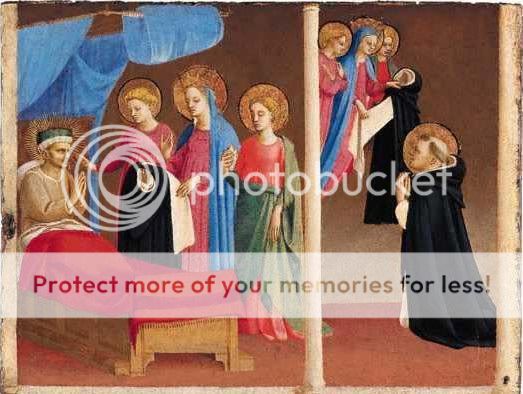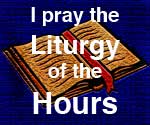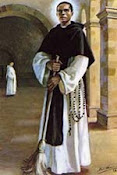Recent Posts
Friday, February 20, 2009
Hate Mail
Blessed Christopher of Milan
His memorial is March 1 on the Traditional calendar.
Thursday, February 19, 2009
Blessed Alvarez of Cordova
- Angels are reported to have helped built Escalaceli, a Dominican house of strict observance he founded, moving stone and wooden building materials to the site during the night, placing them where workmen could easily get them during the day.
- Once when the entire food stocks for the house consisted of a single head of lettuce, he gathered all the brothers at table, gave thanks for the meal, and sent the porter to the door; the porter found a stranger leading a mule loaded with food. After unloading the mule, the stranger and the animal disappeared.
- Alvarez once found a beggar dying alone in the street. He wrapped the poor man in his own cloak, and carried him back to Escalaceli. When he arrived at the house and unwrapped the cloak, instead of man, he found a crucifix. It still hangs in Escalaceli.
- A bell in the chapel with Alvarez's relics rings by itself just before the death of anyone in the house.
- Attempts were made to move Alvarez's relics to Cordova, but each try led to violent storms that kept the travelers bottled up until they gave up their task, leave the bones where they are.
Wednesday, February 18, 2009
Blessed John of Fiesole, a.k.a. Fra Angelico
Instead of reinventing the wheel, here's a blurb about him from the Dominican Ordo:
Tuesday, February 17, 2009
The Dominican Habit
It has been often mentioned how striking and beautiful the habit of the Order of Preachers is. I have to agree and fully admit bias.
As the well known history goes, Bl. Reginald was showed the habit the order should wear in a vision from the Blessed Virgin. Until that time, the habit of the Canons Regular of Osma was worn as that was the original order of St. Dominic.

The Vision of the Dominican Habit

Dominican friars wearing the capella romano with their habits

Contemporary friars (from the official US OP site)


Dominican sister from Krakow (from their site)
Blessed Reginald
 It has been written, very often, that Bl. Reginald is the most mentioned of the early members of the order. He is one of the most distinguished of St. Dominic's early disciples, highly praised by Bl. Jordon of Saxony. From what has been passed down to us, this praise is deserved.
It has been written, very often, that Bl. Reginald is the most mentioned of the early members of the order. He is one of the most distinguished of St. Dominic's early disciples, highly praised by Bl. Jordon of Saxony. From what has been passed down to us, this praise is deserved.In his desire to better emulate the Apostles, he sought out St. Dominic when both happened to be in Rome to seek out the life he wanted with the new order being formed.
Bl. Reginald serves as relevant an example of the Order and its mission today as when he walked in this world - he fully encompased prayer, study, communtiy and apostlate.
SEQUENCE
O Beate Reginalde
Summo Regi grains valde,
Qaem amans Regina cœlomm
Proprium visitans thorum,
Ab omni febris languore
Miro euravit dnlcore,
Habitnm dans Prædicatorum,
Expelle febres peccatornm.
Tuis precnm incrementis
Sana febres nostras mentis,
Ut cum coetn supernornm
Cernamus regem angelorum.
Monday, February 16, 2009
Blessed Nicholas Paglia
Blessed Nicholas was born at iovinazzo, near Bari, Italy, in 1197. While pursuing studies at Bologna, he was drawn to the Order by a sermon of Saint Dominic who personally gave him the habit and made him one of his travelling ompanions. e was well-known for his preaching throughout the Roman Province and compiled a concordance of sacred cripture. He died at Perugia in 1256.
Blessed Bernard Scammacca, OP
Today is his memorial on Traditional Calendar
11 January is his memorial on the current General Calendar
 Born in Catania, Sicily; died 1486; cultus approved 1825. Born of wealthy and pious parents, Bernard was given a good education. In spite of this good training, he spent a careless youth. Only after he was badly injured in a duel was he brought back to his senses. His long convalescence gave him plenty of time to think, and once he was able to go out of the house, he went to the Dominican convent of Catania and begged to be admitted to the order.
Born in Catania, Sicily; died 1486; cultus approved 1825. Born of wealthy and pious parents, Bernard was given a good education. In spite of this good training, he spent a careless youth. Only after he was badly injured in a duel was he brought back to his senses. His long convalescence gave him plenty of time to think, and once he was able to go out of the house, he went to the Dominican convent of Catania and begged to be admitted to the order. Bernard, as a religious, was the exact opposite of what he had been as a young man. Now he made no effort to obtain the things he had valued all his life, but spent his time in prayer, solitude, and continual penance. There is little recorded of his life, except that he kept the rule meticulously, and that he was particularly kind to sinners in the confessional. Apparently, he did not attain fame as a preacher, but was content to spend his time in the work of the confessional and the private direction of souls.
The Blessed Bernard Scammacca prevented the burglary of his own incorrupt corpse. A nobleman and his companions entered the monastery where the body was enshrined, hoping to remove it. As they tried to life the relic, it suddenly became heady, and they were caught in the act by the awakened friars.
Prayer:
Sunday, February 15, 2009
Saturday, February 14, 2009
Saint Valentine's Day
 Valentine’s Day, which is properly SAINT Valentine's Day for Catholics, is predominantly now associated with expensive gifts, roses and sweet cards for the romantically involved and bitter diatribes against the customs for the single people.
Valentine’s Day, which is properly SAINT Valentine's Day for Catholics, is predominantly now associated with expensive gifts, roses and sweet cards for the romantically involved and bitter diatribes against the customs for the single people. Some may think it trivial, but the name of the day is important, especially for those of us who are Catholic. I do not have a personal problem or conflict with the secular celebrations attributed to the saint or the day; they are relatively harmless and come from much, much later folk traditions that do not profane or contradict the memory of any ancient saint of that name. But it is named after a saint. Despite this day being reduced from feast to commemoration by Pope Pius XII in 1955, and it's full removal from the current General Calendar in 1969, we still have a holy man that remains in the Roman Martyrology from the 5th century to the present. Therefore, he continues as an ancient witness to the faith. For Catholics, this also serves as example to the myriad of daily reminders of how central the faith is to our daily lives. (An interesting note is that the St. Valentine's feast day in the Eastern Church is July 4).
Take away the Saint and you take away the reminder and do an injustice to one of the many that paid the ultimate price to retain the belief in the gift to be handed down to us!












